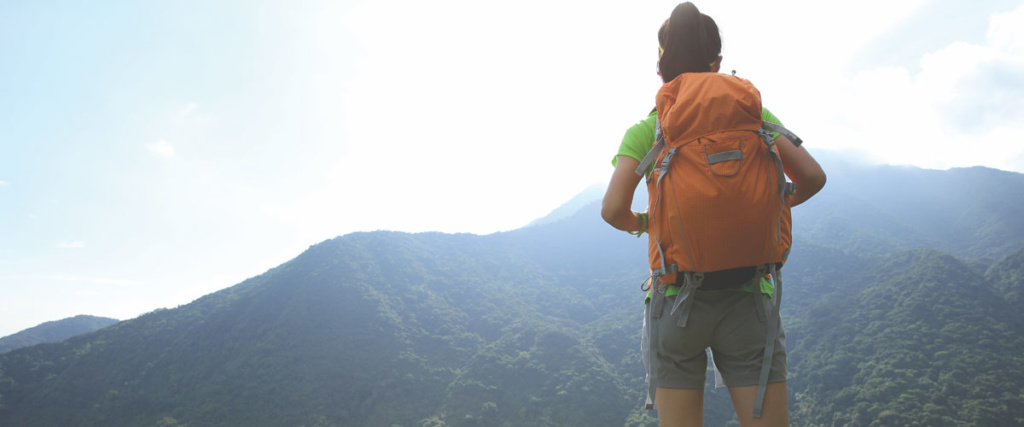Jaye only told me about the bears, the mountain lions, and the tragic deaths (“just seven in 30 years”) once she arrived home from the wilderness. And it was true wilderness—no electricity or running water, no toilets or cell phone service. During her six months away, she’d kept in touch through hand-written letters describing her work building trails in the California back country. Funny how she never mentioned wild animals, physical danger, or mountains so steep if you took two steps off the trail on a foggy day you’d fall hundreds of feet to your death.
But once she was home she described everything. I could see why she’d held back. Our first 20 years together I’d been dedicated to protecting my firstborn—watching over her so she didn’t get hurt, doing all I could to keep her safe and secure.
Now 24, Jaye was protecting me. She knew I’d have worried if I knew the truth. The mountains of Shasta-Trinity National Forest were beautiful, but they could be perilous. Her daily routine included chasing bears away from the cook tent, carrying a 50-pound pack loaded with tools to and from her work site, digging out boulders so huge that if they rolled the wrong way they’d crush her, returning each evening to sleep in her one-person tent.
Eighteen months ago, if you’d asked me whether my older daughter was capable of this, I’d have snorted in ridicule. Jaye was a princess. Wore makeup every day. Flat-ironed her hair before going out. Nitpicked everything, from food to clothing. No way could I see her breaking rocks. Digging trenches. Bathing in frigid mountain streams. Going without deodorant, soap or shampoo.
Most parents have big dreams for their children’s futures, anticipating a life better and brighter than their own. Back when Jaye decided to go to college 12 hours away for a theater degree, I pictured her climbing the ladder of success, auditioning for small parts, earning bigger roles, maybe coming home to perform at Syracuse Stage someday.
I never thought she’d say, “I’ll finish my degree, but I don’t want to make this my career.” Or come back to Central New York to work one year at a customer service desk job and then tell me, “I can’t do this. I don’t want this to be my life. I’ve got to make a change.”
Our kids spend childhood getting away from us. First they crawl, then they run, then it’s friends, school, college that increase the distance. We may try to aim them, but their personal trajectory arcs toward independence.
And yet from the moment our children first assert themselves, what do we parents say? No, don’t do that. Don’t leave my sight. Don’t play in the street. Don’t go anywhere without telling me. Don’t stay out late. Don’t. No. Don’t.
I was an especially fearful parent, warning the girls about stranger danger and how to avoid abduction. When I read that a plain shirt button could be inserted into a car’s ignition slot where the key goes—thereby preventing a would-be abductor from driving away—I told Jaye but assumed it’d go in one ear and out the other. Years later, she confessed she’d stuck a button in every pair of shoes because of what I said.
Instead of feeling proud, I felt guilty. Did I make her paranoid? Did I pass my fear onto her?
The distance college imposed was good for Jaye. Without buzzkill Mom hovering, she tried offbeat, unexpected things. In a class at Improv Olympics in Chicago, she learned that most people, when faced with an idea that isn’t their own, will say, “No, but” and kill the moment. That’s why the basic principle of improv is to respond with “Yes, and.”
In other words, agree with—and build on—what’s offered.
We’ve all been told, “Parenting is an adventure,” but what we should be told is, “Every child is born an adventurer.” Our job is to help our kids go forward, not hold them back. What if parenting were more like improv? Suppose you said, “Yes, and”? If you open your mind like you open a map, adventure naturally unfolds.
Yes, and is why Jaye thrived in the wilderness. Yes, and is how she learned that you can scare off a bear by making yourself look bigger and by making a lot of noise. Yes, and is why she went on a 47-mile hike up and down three mountain peaks in one weekend just for fun.
She came back different, and only stayed two months. This summer she’s in the Colorado Rockies, doing trail work again. While she was home, our family took a day trip to the Catskills for an “easy” hike up a short mountain trail. As we climbed, she explained how trails are built and maintained. She pointed out rocks that had been embedded deeply to guide rainwater off the path so it wouldn’t scour the trail.
“I never noticed them before,” I said. “I thought they were natural.”
“That’s the whole idea behind trail building. You don’t want the work to be obvious. You want it to look natural. If you build it carefully, you won’t have to worry about it once you’re done. You should check it once a year or so, but it should maintain itself.”
I knew she was describing her work and what she’d learned last summer, but I felt as if she’d just given a TED Talk on how to raise an adventurer.
I wanted to wrap my arms around her, tell her how happy I was that the no, don’ts of her childhood hadn’t saddled her with any self-limiting beliefs as an adult. She was a trailblazer in every sense of the word: strong, bold, fearless despite my anxious mothering. Yes! I wanted to shout, affirming her, the path she’s chosen, the life she’s built. Yes and yes and yes!





